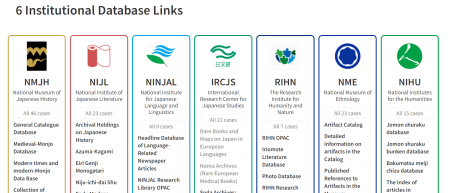ACTIONS
- Protect and safeguard cultural and natural heritage
- Learning and educational opportunities
- Cultural participation/social inclusion
- Sustainable tourism
- Support research
- Employment (recruiting, training, safety)
- Energy consumption, greenhouse gas emissions
- Waste management and reduction
- Transport (forms of, energy use)
- Commercial activities including copyright and IP
- Governance and management
- Security, disaster preparedness, risk reduction
- External partnerships and collaborations
- Sign-post to other resource (database)
nihuBridge Portal

Intended Audience
Students, researchers, educators, cultural professionals working with subject matters related to Japan, especially arts, literature, classics, cultural studies, history, geography, and folklore studies.
- National Institutes for the Humanities (NIHU), Japan
“nihuBridge is a portal site for sharing and utilizing various research resources published by the National Institutes for the Humanities and collaborative organizations.”
It redirects users to over 140 databases maintained by six institutions namely, National Museum of Japanese History, National Institute of Japanese Literature, National Institute for Japanese Language and Linguistics, International Research Center for Japanese Studies, The Research Institute for Humanity and Nature, National Museum of Ethnology, and the National Institutes for the Humanities dedicated to Japanese Studies in primarily subject areas in the arts and humanities.
Avaiable in
- English
- Japanese
SDGs LINKAGES
This user-friendly, easily navigable resource portal contains a wealth of materials from research publications to images of digitalised collections related to an array of subject matters and academic interests concerning primarily the Japanese culture, history, and society. Although the SDGs are not mentioned in this resource portal, it helps users to address SDG targets 4.7 (global citizenship and appreciation of cultural diversity), 10.2 (empowerment and inclusion of all, irrespective of ethnicity, origin, and religion), 11.4 (protection of world’s cultural heritage), 16.10 (enhance public access to information), 17.6 (enhance global and national-level partnerships in knowledge and expertise sharing in the field of Japanese Studies), 17.16 (sharing of knowledge and expertise among partners) and 17.17 (facilitate partnerships among global researchers, cultural and research organisations around the world).
Click on the SDG Target to discover Our Collections Matter indicators
-
Our Collections Matter indicators:
- Numbers of people in each type of programme drawing on collections from different demographic groups.
- Increases in numbers of people in each type of programme from different demographic groups.
- Proportion of people involved in such programmes in relation to overall audience size.
- Evidence that learners have acquired knowledge and skills to promote sustainable development.
-
Our Collections Matter indicators:
- Collections development to ensure that collections effectively meet the needs of all, irrespective of age, sex, disability, race, ethnicity, origin, religion or economic or other status.
- Number and proportion of educational and participatory programmes that promote participation irrespective of social or other status.
- Numbers and proportions of people making use of collections in relation to the demographic of the local population.
- Numbers and proportions of people involved in focused programmes aimed at promoting social, economic and political inclusion.
- Numbers and proportions of people from different demographic groups involved in decision-making processes relating to collections and collections-based institutions.
- Number and types of partnerships that build relationships with marginalized groups, individuals and communities.
-
Our Collections Matter indicators:
- Total expenditure (public and private) per capita spent on the preservation, protection and conservation of all cultural and natural heritage, by type of heritage.
- Plans, policies and procedures in place for the safe use of collections for a variety of purposes, protecting and safeguarding both collections and those who use them.
- Plans, policies and procedures in place for the identification, safeguarding and protection of cultural and natural heritage at risk.
- Collecting programmes in place to protect, safeguard and make use of cultural and natural heritage, addressing the needs of communities and stakeholders, and ensuring that collections can be an effective resource for sustainable development.
- Number and diversity of educational, awareness-raising, research programmes, and partnerships that aim to strengthen protection of cultural and natural heritage.
-
Our Collections Matter indicators:
- Adopt and implement constitutional, statutory and/or policy guarantees for public access to information.
- Plans in place, and plans implemented to enhance public access to information relating to collections.
- Plans in place, and plans implemented to support fundamental freedoms, in line with human rights, national and international agreements and legislation.
- Plans and procedures in place for public access to information relating to the operation and management of collections-based institutions.
- Complaint mechanism in place for public to use where public access to information and fundamental freedoms not supported or fulfilled.
-
Our Collections Matter indicators:
- Number and/or increase in number, and diversity of global and international multi-stakeholder partnerships that share collection-related knowledge, expertise, technology and financial resources to address the SDGs, or that otherwise involve collections-based organisations and institutions.
- Number and/or increase in number, and diversity of global and international multi-stakeholder partnerships involving developing countries that share collection-related knowledge, expertise, technology and financial resources to address the SDGs.
-
Our Collections Matter indicators:
- Amount of United States dollars committed to public-private and civil society partnerships.
- Number and/or increase in number, and diversity of local, national and regional multi-stakeholder (public, public-private and civil society) partnerships that address the SDGs drawing on collections, or that otherwise involve collections-based organisations and institutions.
-
Our Collections Matter indicators:
- Number and diversity of North-South, South-South and triangular co-operations and projects to support access to science, technology and innovation and enhance knowledge-sharing on mutually agreed terms.
